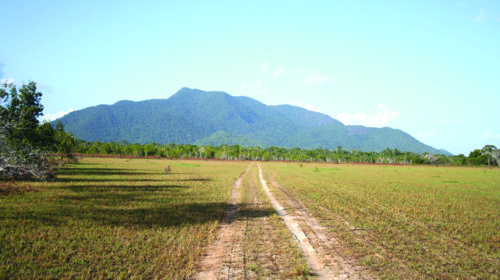 They know what the problem is, but according to Citizenship Minister Winston Felix, the Government has been unable to get control of the rampant backtrack use at Guyana’s borders by immigrants.
They know what the problem is, but according to Citizenship Minister Winston Felix, the Government has been unable to get control of the rampant backtrack use at Guyana’s borders by immigrants.
Felix made this admission during a press conference at his headquarters on Wednesday. The Minister originally called the press conference to clear the air on his recent meeting with Haitian immigrants.
He was reminded that during an appearance before the Parliamentary Subcommittee on Foreign Relations, he had expressed concerns over the use of backtrack routes and the fact that this accounts largely for the disproportionate number of persons leaving the country compared to those entering.
“At that time, I was referring to both the Corentyne coast as well as to the Rupununi. And the situation is the same. If you examine what is happening on the Corentyne, you will discover that there is no way you can put your hand on anyone leaving backtrack. Because of the number of backtrack use they have,” Felix said.
“You can start from [Number] 64, 62 [Villages] to Moleson creek. There’s no way you can do that. I worked in that area. We tried to arrest backtrackers. You know what? Even before cell phones came out, they had signals. So boat would come in and they would remain out on the sea and wait you out.”
Felix noted that as a consequence of issues including jurisdictional constraints on the sea, the backtrack routes on the Corentyne coast have not been completely shut down. Felix noted that monitoring backtrack traffic in the Rupununi is even more difficult.
“Because it’s over a thousand miles of border between Guyana and Brazil. What is being done now is to check the really vulnerable areas where anybody might be leaving and to see how well we can manage it to create a deterrence against using Guyana as a transit point without reporting to immigration.”
The Minister also admitted during his press conference that there will always be weaknesses in the system that the Government will have to keep an eye on. Asked if the Government’s theory was that these immigrants were indeed leaving and not settling illegally in Guyana, Felix claimed that it was.
“No, they’re not staying here. And we know that they’re leaving,” the Minister said, adding that the issue is not just political will. According to Felix, adequately patrolling the border requires technology, a reaction force, training and funding.
Recent records from the authorities had shown that over 22,000 persons entered Guyana from January to April. The Ministry had revealed that of this number, only 6170 had departed. In addition, it was shown that there are no records of 17,615 immigrants departing from 2013 to 2018.
A breakdown of the statistics shows that over the past 7 months, over 8500 Haitians entered the country, but a fraction of that number left. In 2017, 3515 Haitians came but only 291 departed. And according to media reports, up to April of last year, 1238 came and 85 departed.
In 2017, a total of 44,747 Cubans came to Guyana, but 7255 were unaccounted for. Recent figures released by the authorities indicate that for the first seven months of the year, 41,272 Cuban nationals came to Guyana via the Cheddi Jagan International Airport (CJIA).
Meanwhile, the figures indicate that some 11,119 Trinidad and Tobago nationals arrived in Guyana between January and July of 2019. Total arrivals taking into account all nationalities stood at 135,220.
The parliamentary Opposition has been vociferous in its contention that a massive people smuggling ring is being orchestrated. It is a contention that President David Granger and Felix have vehemently denied.
Related posts
-

Ramkarran says GECOM’s 15-day deadline to announce results “not mandatory”
The 15-day deadline referenced in the Representation of the People Act, within which the Guyana Elections... -

Linden man knifes woman and lover to death in jealous rage
A man is in Police custody after he reportedly stabbed his ex-lover and her new spouse... -

Mottley says “there are forces that do not want to see votes recounted”
Chairperson of the Caribbean Community (Caricom), Barbadian Prime Minister Mia Mottley, in a strongly-worded statement said...
